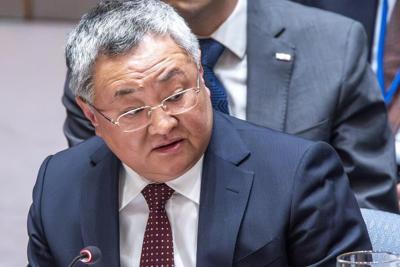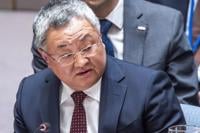UNITED NATIONS (AP) — The U.N. General Assembly adopted a Chinese-sponsored resolution with U.S. support urging wealthy developed nations to close the widening gap with developing countries and ensure they have equal opportunities to use and benefit from artificial intelligence.
The resolution approved Monday follows the March 21 adoption of on spearheaded by the United States and co-sponsored by 123 countries including China. It gave global support to the international effort to ensure that AI is “safe, secure and trustworthy” and that all nations can take advantage of it.
Adoption of the two nonbinding resolutions shows that the , are both determined to be key players in shaping the future of the powerful new technology — and have been cooperating on the first important international steps.
The adoption of both resolutions by consensus by the 193-member General Assembly shows widespread global support for their leadership on the issue.
Fu Cong, China’s U.N. ambassador, told reporters Monday that the two resolutions are complementary, with the U.S. measure being “more general” and the just-adopted one focusing on “capacity building.”
He called the Chinese resolution, which had more than 140 sponsors, “great and far-reaching,” and said, “We’re very appreciative of the positive role that the U.S. has played in this whole process.”
Nate Evans, spokesperson for the U.S. mission to the United Nations, said Tuesday that the Chinese-sponsored resolution “was negotiated so it would further the vision and approach the U.S. set out in March.”
“We worked diligently and in good faith with developing and developed countries to strengthen the text, ensuring it reaffirms safe, secure, and trustworthy AI that respects human rights, commits to digital inclusion, and advances sustainable development,” Evans said.
Fu said that AI technology is advancing extremely fast and the issue has been discussed at very senior levels, including by the U.S. and Chinese leaders.
“We do look forward to intensifying our cooperation with the United States and for that matter with all countries in the world on this issue, which … will have far-reaching implications in all dimensions,” he said.
The Chinese ambassador, however, strongly criticized the U.S. Treasury Department’s proposed rule, announced on June 21, that would restrict and monitor U.S. investments in China for .
“We are firmly opposed to these sanctions,” Fu said. China doesn’t believe the rule will be “helpful to the healthy development of the AI technology per se, and will, by extension, divide the world in terms of the standards, and in terms of the rules governing AI.” He called on the U.S. to lift the sanctions.
The Chinese resolution calls on the international community “to provide and promote a fair, open, inclusive and nondiscriminatory business environment,” from AI’s design and development to its use. Fu said that China doesn’t think the U.S. actions foster an inclusive business environment.
Both the U.S. and Chinese resolutions focus on the , but Fu told reporters the military dimension of AI is also very important.
“We do believe that it is necessary for the international community to take measures to reduce the dangers and the risks posed by the development of AI,” he said.
China is actively participating in negotiations in Geneva on controlling lethal autonomous weapons, Fu said, adding that some countries are considering proposing a U.N. General Assembly resolution this year on the military dimension of AI — “and we are in broad support of that initiative.”
Both the U.S. and Chinese resolutions warned of the dangers of AI while also touting its potential benefits in promoting economic development and the lives of people everywhere.
The U.S. resolution recognizes that “the is an evolving area” that needs further discussions on possible governance approaches. It calls on countries to ensure that personal data is protected, human rights are safeguarded, and AI is monitored for potential risks.
Fu, who headed the Chinese Foreign Ministry’s arms control department from 2018 to 2022, said that Beijing put forward the resolution because of the widening gap in AI technology between the developed North and developing South.
He said China also wanted to highlight the central role the United Nations should play in AI governance as “the most representative and most inclusive international forum.”
The Chinese resolution resolves “to bridge the artificial intelligence and other digital divides between and within countries,” and promote international cooperation, including sharing knowledge and transferring technology to developing countries.








































